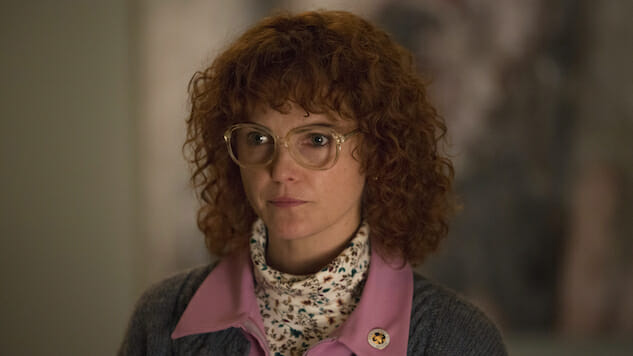The Americans‘ Final Season Is Emerging as a Nuanced, Thorough Critique of Capitalism
(Episode 6.04)
Photo: Eric Liebowitz/FX TV Reviews The Americans
Philip (Matthew Rhys), facing a “rough patch at work” that’s swiftly deepened into a full-blown crisis, spends much of “Mr. and Mrs. Teacup” poring over ledgers and spreadsheets, weighing his heavy debts. His investments in the family travel agency—bigger office, bigger staff—haven’t generated the growth he expected, or so he laments to Stan (Noah Emmerich) over drinks in “Mr. and Mrs. Teacup.” The scene presents the sort of delicious juxtaposition that’s become one of The Americans’ trademarks: the Soviet spy crushed under the pressures of capitalism seeking advice from the FBI agent buoyed by the commonweal. As Stan acknowledges, his own father’s homespun wisdom cuts both ways: “The more you want,” he repeats, “the more you get.”
After “Tchaikovsky,” with its interest in the meaning of work, and “Urban Transport Planning,” with its references to the language of salesmanship, “Mr. and Mrs. Teacup” sees The Americans triple down on its critique of capitalism—one more nuanced, and more thorough, than anything on Mr. Robot. Philip’s sudden skepticism, or perhaps self-doubt, is most arresting because it doesn’t come at the point of Elizabeth’s (Keri Russell) bayonet: During their strange, sweet, softly charged conversation in bed, for instance, she offers reassurances he can’t seem to accept. Philip is “stuck,” and the fact that Kimmy (Julia Garner) can see this through his disguise suggests the depth of his dissatisfaction. The boy so eager for scraps in that cruel Russian winter has learned, in time, to want more, and more, and more, and all he’s gotten is more want in return.
This being The Americans, “Mr. and Mrs. Teacup” is at pains to offer dissenting perspectives, too—or, at least, to underscore the distinction between systems and citizens, to understand that no one escapes the vise of life’s most profound questions. (I wrote extensively about the series’ existentialist bent back in Season Four.) There’s Oleg’s (Costa Ronin) conviction that peace is possible, that “they” — the Americans — “are not crazy.” Or Kimmy’s belief that “you should have the job, the relationship, everything you want.” Or Henry’s (Keidrich Sellati) deflated, disappointed goodbye on the phone with his father. Or the suggestion, in Erica’s (Miriam Shor) suffering, that Elizabeth’s sacrifice, her sense of purpose, may prove no more fulfilling than running a travel agency. “Who cares?” Erica sighs, bleakly, as the end nears. “All those hours, just… Honestly, I wish I’d spent them with Glenn. Just being with him. Doing I don’t know what. It doesn’t matter.”
It’s here that the episode begins to weave together its constituent parts—family, country, ideology; value and values, in every way those terms might be defined—into an utterly exquisite whole, alive to the understanding that what we want, and what we get, and what ends up mattering are in fact separate categories, and it’s in the spaces in between that we risk going under. Despite the title, which refers to Gennadi and Sofia, the two central sequences of “Mr. and Mrs. Teacup” lash Paige (Holly Taylor), Elizabeth, and Philip together, even as circumstance drives them apart. In the first, after Paige and Elizabeth’s narrow escape from the warehouse—I haven’t even mentioned that breathtaking image of Elizabeth shooting out the track lights, disappearing twice into darkness—the family members’ silhouettes literally shadow every turn in the fight that erupts; in the entire sequence, there are a mere handful of shots in which someone’s shoulder or torso doesn’t intrude on the frame, painting the shape of a family unit. In the second, Philip finds solace, joy, in line dancing, as Elizabeth—preparing for the failed World Series play—and Paige—sleeping with a congressional intern—return to work.
In the end, “Mr. and Mrs. Teacup” is a thicket of references to the point at which the deranged want created by capitalism blinds us to what matters—and in The Americans what matters is not money but time, not work but love, not strength but humanity. “All those hours”; “this work can get to be too much for people”; “it’s just not adding up”; “right back into it”; “the more you want, the more you get”: These are simply ways of putting into language the wrenching near-silence of the episode’s most indelible moment, in which Philip offers his wife a beer and she just shakes her head, “No.” Here, separated by the kitchen island, our protagonists confront some of those spaces in between, and they find it impossible to make the connection.
Matt Brennan is the TV editor of Paste Magazine. He tweets about what he’s watching @thefilmgoer.